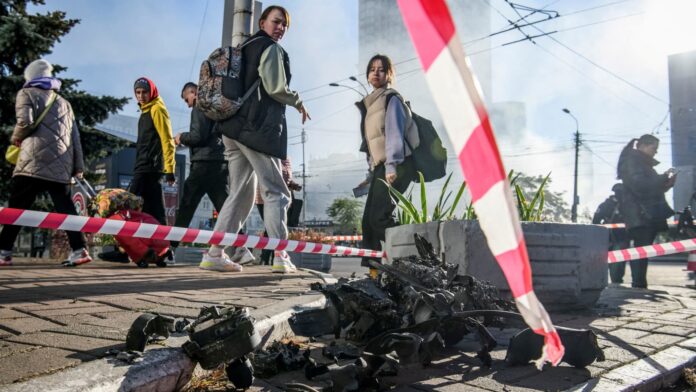Local residents look at parts of an unmanned aerial vehicle, what Ukrainian authorities consider to be an Iranian-made drone Shahed-136, after a Russian drone strike, amid Russia’s attack on Ukraine, in Kyiv on Oct. 17, 2022.
Vladyslav Musiienko | Reuters
The Treasury Department announced new sanctions against three firms and two individuals involved in the production and transport of drones from Iran to Russia to aid in Russian President Vladimir Putin’s war against Ukraine.
The Office of Foreign Assets Control has targeted:
- Shahed Aviation Industries Research Center, which is responsible for the design and production of Shahed-series unmanned aerial vehicles the U.S. says Russia is using in Ukraine
- Success Aviation Services FZC i Jet Global DMCC for organizing the transfer of UAVs to Russia
Shahed-series drones have been used to target civilian infrastructure in Kyiv, Odesa and the Kharkiv region of Ukraine, according to the Treasury.
The sanctions come as the U.S. and its allies look to punish individuals and organizations supporting Russia’s war efforts. The people and groups sanctioned will have property and other interests in the U.S. blocked.
The State Department has also issued concurrent sanctions against paramilitary organization Wagner Group, Iran’s Islamic Revolutionary Guard Corps Aerospace Force and Qods Aviation Industries.
In addition, the Treasury issued sanctions against two individuals — Abbas Djuma and Tigran Khristoforovich Srabionov — for facilitating Wagner Group’s acquisition of drones.
Iranian Ambassador to the U.N. Amir Saeid Iravani previously denied allegations of involvement in supplying Russia with drones, and said claims from Western nations were “unfounded and unsubstantiated.”
In a reversal earlier this month, Iranian Foreign Minister Hossein Amirabdollahian said that Tehran sold a “small number” of drones to Moscow a few months before Russia’s late February invasion.
In October, the U.S. government said it had evidence that Iran sent trainers and technical support to Russian-occupied areas in Ukraine to help Russian troops launch targeted drone strikes. State Department spokesman Ned Price also said Russian officials received training on the UAVs in Iran.
“Russia has received dozens of these UAVs so far. And will likely continue to receive additional shipments in the future,” Price said.
The U.S., Britain and France said Iran violated U.N. Security Council resolution 2231 by providing the weapons to Russia. The resolution prohibits the nation from transferring “all items, materials, equipments and goods and technology” from Iran to another nation without advanced approval from the U.N. Security Council on a case-by-case basis.
Dmitry Polyanskiy, first deputy permanent representative of Russia to the United Nations, told reporters at the U.N. last month that the drones found in Ukraine are not Iranian but Russian-made.


